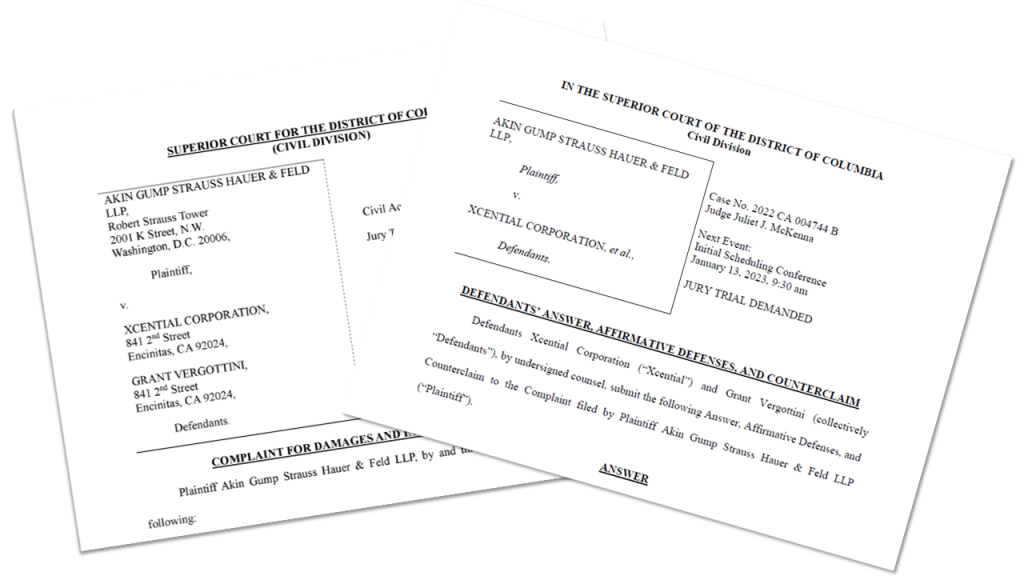
The law firm Akin Gump Strauss Hauer & Feld has lost its bid to dismiss four of five counterclaims filed by the legal technology company Xcential Legislative Technologies in a lawsuit over ownership rights to legislation-drafting software that each side says was its idea.
As I reported here in November, Akin Gump sued Xcential in the District of Columbia Superior Court for misappropriation of trade secrets, breach of contract, and other causes of action, alleging in its complaint that Xcential’s Bill Synthesis software, for which Xcential filed a patent application, was actually invented by an Akin Gump attorney, Louis Agnello, who is counsel to the firm.
In November, Xcential, a 25-person legal technology company in California, fought back, filing an answer and counterclaim denying that its software was based on Agnello’s idea. To the contrary, the company asserted that Agnello stole its idea after it gave him a demonstration of the software in 2019.
Related: Guest Post: David the Inventor vs. the Biglaw Goliath – What Drives A Goliath To Take On A David?
Akin Gump filed a motion asking the court to dismiss Xcential’s counterclaims, arguing that they were barred by the Noerr-Pennington doctrine, a judicially-created doctrine that grants immunity from antitrust laws for legitimate petitioning conduct directed at any branch of government.
Akin Gump argued that because it has filed a Petition to Institute Derivation with the U.S. Patent & Trademark Office challenging Xcential’s patent application, that it is therefore a protected action of petitioning government for redress and they are therefore immunized from civil suit.
But D.C. Superior Court Judge Juliet J. McKenna disagreed. In a ruling issued Feb. 15, she held that, although Xcential had not demonstrated that Akin and Agnello had instituted a sham proceeding before the USPTO (which would be an exception to the doctrine), the doctrine does not extend to breach of contract claims. Further, she said, Xcential’s counterclaims “plausibly implicate actions outside of” Akin’s USPTO petition.
Thus, she let Xcential go forward with four of its five counterclaims, alleging breach of contract based on its end user license agreement (EULA), misappropriation of trade secrets, misappropriation of confidential information, and breach of implied contract.
However, the judge dismissed Xcential’s claim for slander of title, which it based Akin’s and Agnello’s representation to the USPTO that Agnello invented the software.
“Defendants claim only that the representation was false, not malicious, and thus fail to plead an essential component of the first element of the claim,” the judge wrote.
The standard for surviving a motion to dismiss is relatively low, requiring only that the claim “includes well-pled factual allegations” and whether those allegations “plausibly entitle the plaintiff to relief,” Judge McKenna said.
“The Court finds that the Defendants allege sufficient facts to state plausible claims for relief in Counts 1, 2, 3, and 4 to survive the Motion to Dismiss,” she concluded.
“The court has given us the green light to keep playing offense against Akin Gump’s attempt to claim our technology,” said Grant Vergottini, Xcential’s cofounder, chief executive officer, and chief technical officer, in a statement issued by the company.
“Score one for ‘David’ in this David vs. Goliath battle” — a reference to a guest post about the litigation published on this blog by Mark Stodder, president of Xcential.